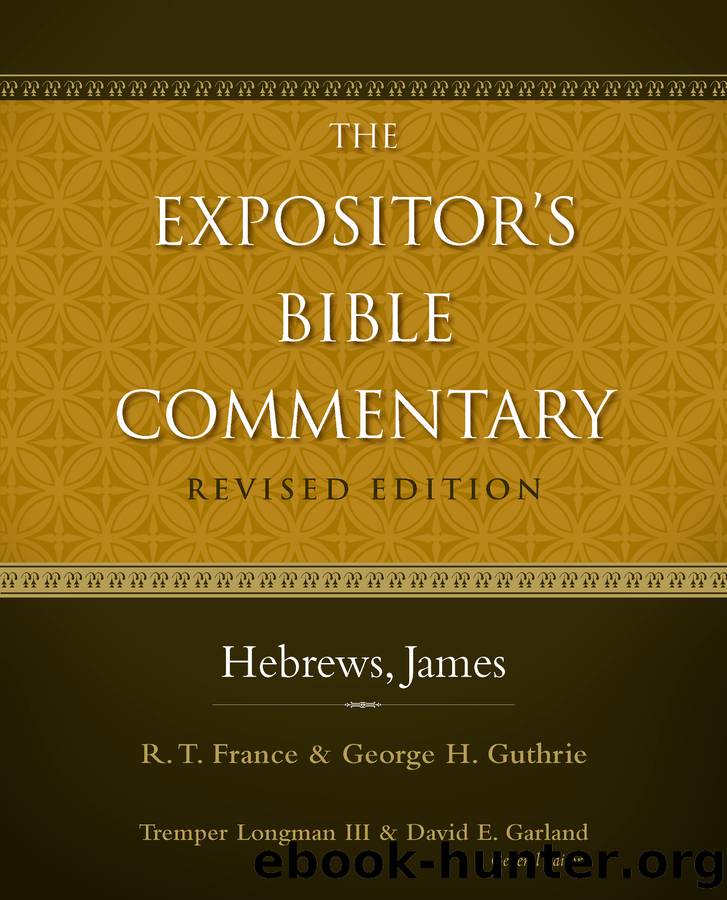Hebrews, James by George H. Guthrie & George H. Guthrie

Author:George H. Guthrie & George H. Guthrie [France, R. T. & Guthrie, George H.]
Language: eng
Format: epub
Tags: REL006070 Religion / Biblical Commentary / New Testament
Publisher: Zondervan
B. Fourth Warning Passage (10:26–31)
OVERVIEW
After the warm confidence of the preceding verses, this passage comes as an unwelcome contrast, but it is not a non sequitur (in Greek it is introduced by “for”; cf. a similar “for” in 6:4). If there is now a “new and living way” into God’s presence, then there are bound to be serious consequences if it is rejected. And the mention in v.25 of members of the church who were beginning to detach themselves raises the serious question of what might happen to them if they persist in this course. The concluding mention of the imminence of “the Day” adds further urgency to the issue of possible apostasy. The result is a warning as serious and as uncomfortable for traditional theology as was 6:4–8; the essential thrust of the two passages is the same.
As in ch. 6, the author here describes the possibility of apostasy objectively without suggesting that what he says is actually true of any of his readers, and following this passage he will again, as he did in 6:9–12, give reasons for confidence that they are not yet in such a state. But here, as there, there would be no point in setting out a purely hypothetical scenario; this is a warning of what could happen if they are not careful. We considered in the comments on 6:4–8 the problem of reconciling such a possibility with a strong doctrine of Christian assurance, and since the same issues in principle arise here, I trust this earlier discussion will suffice to set this passage too in its wider scriptural context. The following comments will therefore focus only on the specific terminology of this second assertion that deliberate apostasy is irrevocable.
The opening words may give the impression the author is speaking here not of the final sin of apostasy but of any and every sin committed after “receiving the knowledge of the truth.” In that case, he would be expressing a rigorism far in excess of anything else in Scripture and impossible to reconcile with pastoral experience. (See Bruce, 262–64, for the debates in the second-century church on the problem of “post-baptismal sin.”) People do sometimes sin after their initial Christian commitment, and the consistent witness of Scripture is that in such cases there is forgiveness (1Jn 2:1–2; etc.); our author implies as much in his references to our high priest’s continuing ministry of intercession for his people (7:25; 9:24; cf. also his sympathy with his people’s weakness in 2:17–18; 4:15–16). But the words used suggest he is not in fact speaking here of any and every sin. In v.26 the sin described is deliberate and continuing, and the extreme language of v.29 recalls that of 6:6 in portraying a decisive reversal of their Christian allegiance and a contemptuous repudiation of the faith (and the Savior) they had once embraced. The subject is again, as in 6:4–8, not just sin but apostasy.
The logic of the argument depends on the preceding account of Christ’s once-for-all sacrifice.
Download
This site does not store any files on its server. We only index and link to content provided by other sites. Please contact the content providers to delete copyright contents if any and email us, we'll remove relevant links or contents immediately.
Hebrews, James by George H. Guthrie & George H. Guthrie(449)
Israel: Ancient Kingdom or Late Invention? by Daniel I. Block(439)
Ideology by Eagleton Terry;(437)
The 9.9 Percent by Matthew Stewart(416)
The New Oxford Annotated Bible with Apocrypha by unknow(407)
Take Back Your Time by Christy Wright(406)
Eating the Bible by Rena Rossner(403)
Insights on Hebrews by Charles R. Swindoll(396)
The Book Every Leader Needs to Read by 48 Authors(394)
Psalms, Proverbs, Ecclesiastes, and Song of Songs by John W. Hilber & Tremper Longman III & Duane Garrett(369)
Commentary on the Torah by Richard Elliott Friedman(343)
Commentary on James (Commentary on the New Testament Book #16) by Robert H. Gundry(341)
Judges: Volume Two by unknow(336)
The Jew in the Lotus by Rodger Kamenetz(335)
Who Wrote the Bible? by Richard Elliott Friedman(333)
NKJV, Ignite, eBook by Thomas Nelson(330)
Job, Ecclesiastes, Song of Songs by August H. Konkel & Tremper Longman III(326)
Proverbs, Ecclesiastes, Song of Solomon (Ancient Christian Commentary on Scripture) by J. Robert Wright(322)
Reading the Bible with Rabbi Jesus by Tverberg Lois(306)
